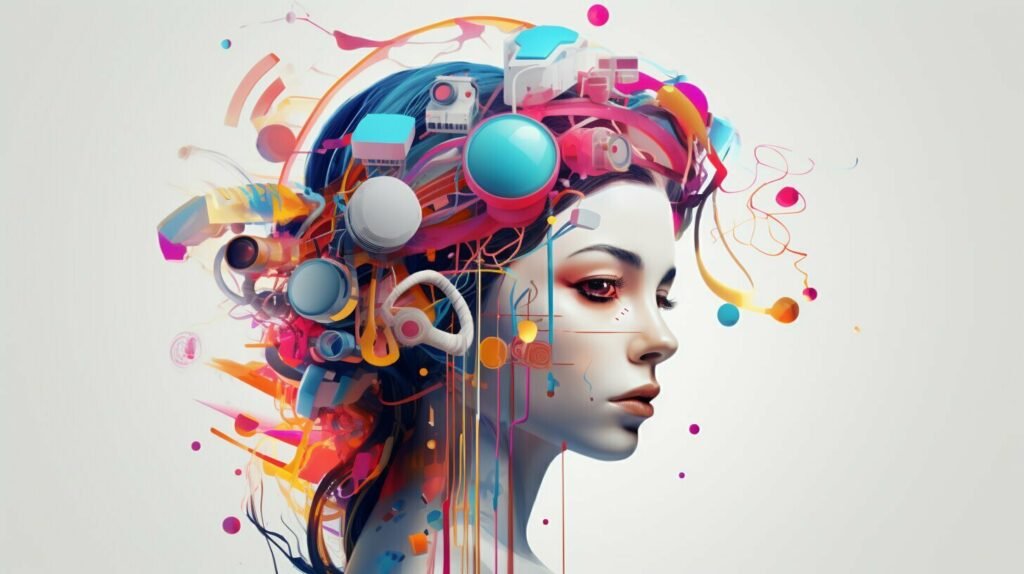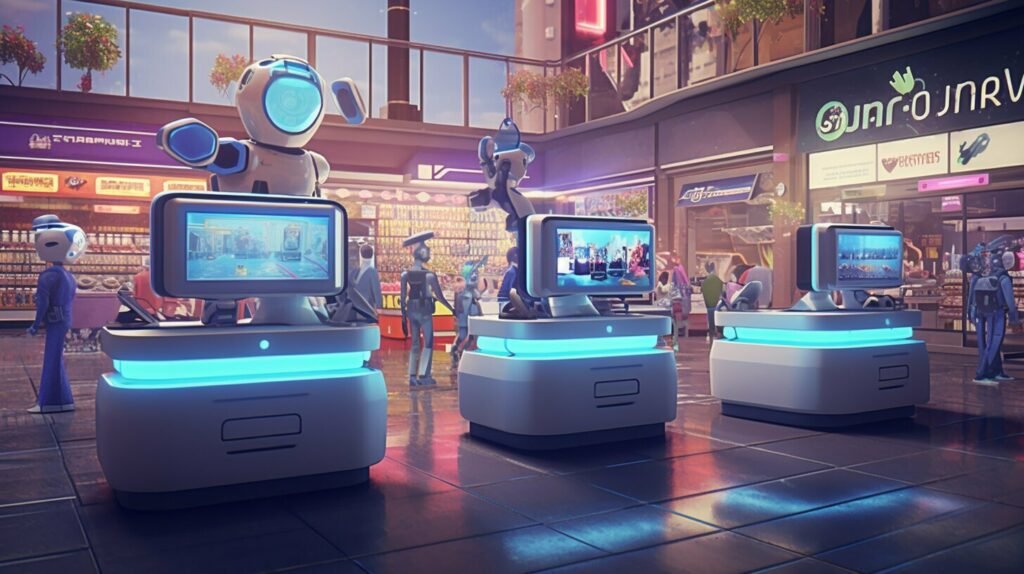Welcome to the future of communication! In recent years, the rise of artificial intelligence chatbot technology has revolutionized the way businesses interact with their customers. AI chatbots are software applications that use natural language processing and conversational AI to simulate human conversation. They can handle a variety of tasks, from answering simple customer queries to assisting with complex financial transactions.
The popularity of AI chatbots has soared due to their ability to improve customer experience, streamline business operations and reduce costs. They provide businesses with an opportunity to engage with customers in a highly personalized and interactive manner, while also providing a cost-efficient way to provide round-the-clock customer support.
In this article, we will explore the power of AI chatbots, their capabilities, and how businesses can benefit from integrating them. We will also provide guidance on how to choose the right AI chatbot for your business needs, implement an effective AI chatbot strategy, and share best practices for maximizing their benefits. Additionally, we will address the importance of security and privacy when implementing AI chatbots and explore the process of integrating them with existing systems and platforms for seamless communication. Finally, we will answer some of the most commonly asked questions about AI chatbots.
So, whether you are a small business owner or a large corporation, AI chatbots are the future of communication, and by implementing them in your business strategy, you’ll be able to stay ahead of the competition and provide top-notch customer service.
The Power of AI Chatbots
AI chatbots are powered by artificial intelligence and chatbot software, making them incredible tools for businesses in improving communication and simplify tasks. These chatbots can converse with customers using natural language processing and conversational AI, allowing them to provide personalized experiences that customers have come to expect. Today, chatbots are becoming the new communication norm, and more businesses are adopting them to improve their operations and customer experience.
The Benefits of Using AI Chatbots in Business
| Benefits | Explanation |
|---|---|
| 24/7 Availability | Chatbots don’t sleep, so businesses can offer round-the-clock customer support. |
| Cost-Effective | Chatbots can handle multiple queries simultaneously, reducing the need for human customer support agents. |
| Personalized Experiences | Natural language processing allows chatbots to provide personalized experiences to each customer, making them feel valued. |
| Increased Efficiency | Chatbots can streamline repetitive tasks, such as appointment scheduling, freeing up employees to focus on more complex tasks. |
Implementing AI chatbots can improve the overall customer experience(ai-powered customer service), saving time and money for businesses. As more advanced chatbot technology becomes available, businesses will be able to offer even more sophisticated and personalized experiences to their customers.

Understanding Chatbot Technology
Chatbots are a type of artificial intelligence (AI) software that uses natural language processing (NLP) and conversational AI to communicate with users. NLP enables chatbots to understand and interpret human language, while conversational AI allows them to respond in a natural and human-like way.
Chatbots rely on a combination of machine learning and rule-based systems. Machine learning enables chatbots to improve their responses over time by learning from previous interactions with users. Rule-based systems use pre-programmed responses to specific queries or inputs.
Chatbots can be designed for specific purposes, such as customer service or sales, and can be integrated with existing systems such as websites or messaging platforms.

“By 2022, the global chatbot market is expected to reach $9.4 billion.”
Chatbot technology is rapidly advancing, and the market for chatbots is expected to continue to grow. As businesses become increasingly focused on improving customer experience and streamlining operations, the use of AI chatbots is likely to become increasingly prevalent.
Benefits of AI Chatbots in Business
AI chatbots have numerous benefits for businesses, from automating repetitive tasks to providing personalized customer support. Here are some of the key advantages of integrating AI chatbots into your business operations:
| Advantage | Description |
|---|---|
| 24/7 Availability | With AI chatbots, businesses can provide round-the-clock support to their customers without incurring additional expenses. This ensures that customer queries are addressed promptly, which can lead to higher customer satisfaction. |
| Cost Savings | AI chatbots can automate routine tasks, such as answering frequently asked questions, scheduling appointments, and processing orders. This can save businesses time and money, as they can allocate their human resources to more complex tasks. |
| Personalization | AI chatbots can provide personalized recommendations and responses based on customer data. This can help businesses tailor their services to their customers’ needs, driving engagement and loyalty. |
| Improved Customer Experience | AI chatbots can handle customer queries in a timely and efficient manner, leading to improved customer experience. They can also offer a more seamless and consistent experience across multiple channels, including social media, email, and messaging platforms. |
| Scalability | AI chatbots can handle a large volume of customer queries simultaneously, making them an ideal solution for businesses experiencing rapid growth. They can also be easily customized and updated to accommodate changing business needs and customer preferences. |
| Virtual Assistants | AI chatbots can act as virtual assistants, helping businesses with tasks such as appointment booking, data analysis, and inventory management. This can free up valuable time for employees to focus on more strategic tasks. |
| Automated Customer Support | AI chatbots can provide automated customer support, including troubleshooting and issue resolution. This can reduce the workload of human customer support teams, allowing them to focus on more complex queries and escalations. |
By providing an efficient and effective communication channel, AI chatbots can enhance the overall performance of businesses, improve customer satisfaction, and drive growth.

The Role of Machine Learning in Chatbots
Machine learning is a critical component of chatbot development, allowing them to improve their performance over time. By analysing data from previous interactions, chatbots can learn how to better understand and respond to user requests.
One of the key benefits of machine learning is the ability to automate tasks that were previously done manually. For example, a chatbot could learn how to handle customer complaints by analysing past conversations and identifying common issues. This would free up employees to focus on more complex tasks.
Another advantage of machine learning in chatbots is the ability to make predictions based on user behaviour. By analysing user data, chatbots can predict what a user might want or need before they even make a request. This can lead to a more personalised and streamlined user experience.
It’s important to note that machine learning in chatbots requires a significant amount of data to be effective. Without a large enough dataset, the chatbot may not be able to make accurate predictions or improve its performance.

Overall, machine learning is a powerful tool for chatbot development. By enabling chatbots to learn and adapt to user behaviour, businesses can improve customer interactions and streamline their operations.
How to Choose the Right AI Chatbot for Your Business
Choosing the right AI chatbot for your business can be a daunting task, with so many chatbot software options available. Here are some tips to help you make a decision:
Determine Your Business Needs
Before selecting a chatbot software, it’s essential to understand your business needs. Consider the type of tasks you want your chatbot to perform, whether it be customer support, sales, or lead generation.
Think about the features you require, such as natural language processing, sentiment analysis, or integration with existing systems.
Research Chatbot Software Providers
Researching chatbot software providers can help you narrow down your options. Look at the features and pricing offered by each provider and read reviews from other businesses that have used their services.
Consider if the software can be tailored to suit your specific business needs. Some chatbot software providers offer customized chatbot development to fit your requirements.
Choose a User-Friendly Interface
It’s essential to select a chatbot software with a user-friendly interface that is easy to manage and update. Ensure you choose a software provider that offers excellent customer support to assist you with any issues or questions you may have.
Test Before Implementation
Before implementing a chatbot, it’s crucial to test the software to ensure it meets your business needs and functions as expected. This testing phase will give you an opportunity to identify any problems and make necessary adjustments before deploying the chatbot to your customers.
Remember, selecting the right AI chatbot for your business can significantly enhance customer experience and improve business operations. Take the time to research and test your options to ensure you make an informed decision.

Implementing an AI Chatbot Strategy
Implementing an effective AI chatbot strategy requires careful planning and consideration of various factors. Here are some key steps to follow:
Define Your Objectives
Before you begin implementing your AI chatbot strategy, it’s essential to define your objectives. What do you want to achieve with your chatbot? Are you looking to provide better customer support, streamline operations, or increase sales? Having a clear understanding of your goals will help you determine the type of chatbot you need to build, the features it requires, and the metrics you’ll use to measure success.
Choose the Right Chatbot Platform
Choosing the right chatbot platform is critical to the success of your AI chatbot strategy. There are many chatbot development platforms available, each with its own strengths and weaknesses. Consider your budget, the complexity of your chatbot, and the level of customization you require when selecting a platform.
At SEOWriting.ai, we recommend using our chatbot software to develop your chatbot. Our platform is user-friendly, and flexible, and offers a range of advanced features, making it an ideal choice for businesses of all sizes.
Design Your Chatbot
Once you’ve chosen your chatbot platform, it’s time to start designing your chatbot. Keep in mind the objectives you defined earlier and create a chatbot that aligns with your brand and user needs. Focus on creating a conversational and intuitive user experience that encourages engagement and interaction.
Make sure to test your chatbot thoroughly before deploying it to ensure it works seamlessly and provides the desired outcomes.
Train Your Chatbot
Training your chatbot is crucial to its success. Use natural language processing (NLP) and machine learning algorithms to teach your chatbot how to understand user queries accurately and respond appropriately.
Through continuous training, your chatbot will learn to become even more sophisticated and better able to serve your customers’ needs.

Monitor and Optimize Performance
After deploying your chatbot, it’s essential to monitor its performance regularly. Use analytics tools to track user engagement, user sentiment, and other metrics to gauge its effectiveness and identify areas for improvement.
Optimize your chatbot’s performance by making continuous updates and improvements based on user feedback and data analysis.
By following these steps, you can develop a successful AI chatbot strategy that improves customer engagement, streamlines operations and helps grow your business.
AI Chatbot Best Practices
Implementing an AI chatbot can bring significant benefits to your business, but it’s important to ensure that you’re using it in the most effective way possible. Here are some best practices to keep in mind:
- Focus on user experience: When designing your chatbot, keep the user experience in mind. Make sure it is easy to use, intuitive, and responsive to customer needs. A well-designed chatbot can help you build long-term relationships with your customers.
- Personalize interactions: Use natural language processing and machine learning to personalize your chatbot interactions with users. This can create a more engaging experience and improve the chances of converting a lead into a customer.
- Be transparent: Communicate clearly with users that they are interacting with a chatbot rather than a human. This helps to manage user expectations and avoids confusion.
- Train your chatbot: Test your chatbot thoroughly before launching it to the public. Fine-tune its responses and train it to recognize a variety of inputs. This will improve accuracy and ensure that your users get the best possible experience.
By following these best practices, you can ensure that your chatbot is an effective tool to enhance your customer service, boost engagement, and drive growth for your business.

Chatbot Integration with Existing Systems
Incorporating an AI chatbot into your business operations requires seamless integration with existing systems and communication platforms. It is important to ensure that the chatbot can easily communicate with other systems in order to perform its tasks efficiently.
One of the key considerations when integrating an AI chatbot is to identify the specific areas of your business that could benefit from the chatbot’s capabilities. This will help determine what systems the chatbot needs to integrate with, such as customer relationship management (CRM) software or inventory management systems.
Another important consideration is data compatibility. The chatbot must be able to work with the data format used by the existing systems to ensure the accuracy of the information and avoid errors or discrepancies.
Once you have identified the systems and data format, the next step is to establish a connection between the chatbot and the existing systems. This can be achieved through API integration, webhooks, or other methods depending on the systems being used.

It is important to thoroughly test the integration process to ensure that the chatbot is functioning properly and data is being transmitted accurately. This will help prevent any issues that may arise in the future due to integration errors.
Overall, integrating an AI chatbot with existing systems can greatly enhance the efficiency and effectiveness of business operations. By carefully considering the specific needs and ensuring seamless integration, businesses can take full advantage of the abilities of these innovative technologies.
AI Chatbot Security and Privacy Considerations
When implementing AI chatbots, it is crucial to consider security and privacy to protect sensitive data and maintain customer trust. Here are some important considerations:
| Consideration | Description |
|---|---|
| Data Encryption | Ensure that data transmitted between the user and the chatbot is encrypted to prevent interception and hacking. |
| Access Controls | Limit access to chatbot data and systems to only authorized personnel to prevent unauthorized access. |
| Data Retention | Clearly define data retention policies to minimize data exposure in the event of a security breach. |
| Privacy Policies | Develop and communicate clear privacy policies outlining how user data is collected, used and stored by the chatbot. |
In addition, it is important to ensure that the chatbot complies with relevant data privacy laws, such as GDPR. Failure to comply with these regulations can result in severe legal and financial consequences for businesses.
It is also important to consider potential biases that may be embedded in AI chatbot programming, which can result in discrimination or unfair treatment of certain individuals or groups. Regular testing and monitoring can help identify and address these issues.
Overall, it is crucial to prioritize security and privacy when implementing AI chatbots to ensure the protection of sensitive data and maintain customer trust.

Frequently Asked Questions about AI Chatbots
As AI chatbots become increasingly popular, you may have questions about their functionality and impact on businesses. Here are some of the most commonly asked questions:
What exactly is an AI chatbot?
An AI chatbot is a computer program designed to interact with humans through chat or voice interactions. It uses artificial intelligence and natural language processing technologies to understand and respond to user inquiries.
How do AI chatbots benefit businesses?
AI chatbots can provide businesses with a cost-effective and efficient way to handle customer inquiries and support. They can also automate various tasks, such as appointment scheduling, to free up employee time for more complex tasks.
Can AI chatbots replace human customer support?
While AI chatbots can handle many routine customer inquiries, there will always be a need for human support for more complex issues. However, the use of AI chatbots can reduce the workload on human support staff and allow them to focus on more pressing matters.
Are AI chatbots easy to implement into a business?
Implementing an AI chatbot requires careful planning and consideration. However, with the right resources and support, it can be a relatively smooth process. It’s important to choose the right chatbot software and ensure proper integration with existing systems.
What are some best practices for designing an AI chatbot?
Some best practices for designing an AI chatbot include keeping the interface simple and user-friendly, providing clear and concise responses, and incorporating personalization where possible. It’s also important to continually gather feedback and improve the chatbot’s performance.
How do AI chatbots ensure data privacy and security?
AI chatbots must be designed with data privacy and security in mind, including measures such as encryption, access controls, and regular audits. Businesses must also ensure compliance with relevant data protection regulations.
What are the future implications of AI chatbots?
As AI chatbots continue to improve, they have the potential to revolutionize the way businesses interact with customers and handle tasks. They could also have a significant impact on the job market, potentially displacing certain roles while creating new opportunities in AI-related fields.
Overall, AI chatbots are an exciting technology that businesses can utilize to streamline operations and improve customer support. With careful planning and implementation, the benefits of AI chatbots can be fully realized.


